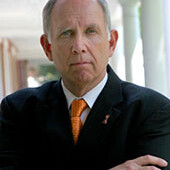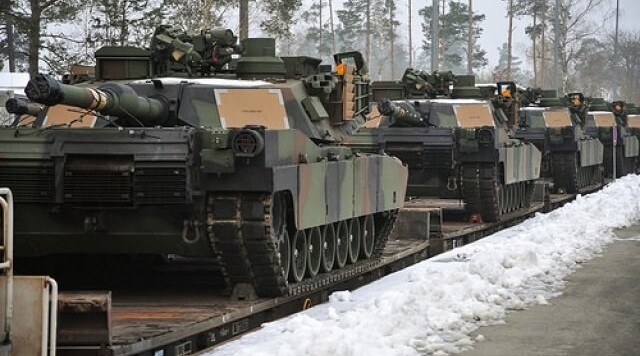"I just couldn't conceive of a battlefield now without contractors," says Olson, former Major General in the U.S. army and now an independent defense contractor. He discusses the effect of contractors on the military profession, accountability issues, and the roles contractors play.
This is one of a series of interviews that took place at the April 2009 McCain Conference, held at the Stockdale Center for Ethical Leadership, U.S. Naval Academy.
These are the other three:
Jeffrey McCausland Interviews James Carafano: The Role of Contractors in Combat
Joel Rosenthal Interviews Thomas Griffith: When Is Military Outsourcing Appropriate?
Joel Rosenthal Interviews Colonel Thomas X. Hammes: Unexplored Issues Regarding Military Contractors
JEFFREY MCCAUSLAND: It's a great pleasure to be joined today by Major General (Retired) Rick Olson, a good friend and retired general of the United States Army.
General Olson served, after retirement from active service, as the deputy director of the Iraq Reconstruction Management Office in Baghdad, Iraq, the United States State Department. He subsequently served as chief of staff for the Special Inspector General for Iraq Reconstruction back here in Washington and, therefore, is a noted expert on the issues of reconstruction and the application of military force and the implication for contractors on the modern battlefield.
Rick, let me start off by asking you the question, in terms of contractors on the modern battlefield, have we moved so far in our dependency on contractors that this is now a permanent fixture, if you will, of U.S. military operations, even beyond Afghanistan and Iraq? Would we want to go back to where we were many years ago, even if we could?
ERIC OLSON: I think, Jeff, that we have moved as far as we have out of necessity. I just don't think we could conceive of a battlefield now without contractors performing many of the functions that they are performing. It is not within the realm of possibility that we can replace contractors with the force structure—with the soldiers, sailors, airmen, marines—that it would take to perform these functions.
I think we have contractors on the battlefield. I think they are reality; they are here to stay. And I would go further and say we are not overly dependent upon them. We certainly are dependent, and I don't think that's necessarily a bad thing.
JEFFREY MCCAUSLAND: Rick, moving along this trend line of increased use of contractors for a multiplicity of tasks, has this really been, to your mind, an incremental change in terms of policy—you have been involved with the policy—or, really, has it been a strategic choice?
Perhaps, are we at a critical juncture here, with a new administration, the Quadrennial Defense Review, a lot of discussion in the State Department about expanding the capacity for reconstruction? Are we at a juncture to perhaps think about this more strategically long-term, into the future?
ERIC OLSON: That's a great question. If you look at numbers, you could make the argument that it has changed incrementally, though if you go over history and look at the percentage of forces that were there, there have been ups and there have been downs.
I think we are at a very critical juncture. I think there are some significant strategic questions that need to be answered. I think those questions have to do with, not so much the direct effects or the immediate effects on the battlefield, but the larger effects of an increasing role for contractors in combat operations—the effect of that on the military as a profession. What does it mean to be a military professional? What functions does the military perform? What are the core competencies of the military?
I think those are all questions that need to be dealt with as we see more and more contractors come on the battlefield.
JEFFREY MCCAUSLAND: Let me probe you on that a little bit, Rick, for a second. No one will argue, I think, about the efficacy of using contractors for food service or for field sanitation, for those kinds of things.
Is there a limit? Is there a dividing line that we can try to define in some fashion that says, at this particular juncture, these tasks really need to be performed by the professional military and these tasks perhaps by the contractor?
Maybe it's a division between what you and I are familiar with, and that is combat support, combat services support, and combat operations. Are there some ethical and legal challenges embedded in trying to ascertain where that limit is?
ERIC OLSON: Yes, I think so. Jeff, our experience in combat arms—there are no bright lines, I don't think. But in the combat arms, I think, by and large, in whatever services we are talking about here, when the competency has to do with closing with and destroying an enemy, that has to be reserved to a professional military. That's the management of violence. I think those functions cannot be contracted out.
I think there are certain supporting functions that can and, I would say—going back to your first question—must be contracted out, given the extent of the logistical challenges that some of the operations we are undertaking today pose.
So yes. But again, I don't think there are any clear-cut categories in neat boxes that you can put these different functions or competencies into.
JEFFREY MCCAUSLAND: Now moving along and thinking about it from a policy standpoint, as we see more and more contractors, particularly those taking on a role that requires arms and the use of force, does it potentially become more likely for policymakers to choose violence if they have the efficacy of saying, "Well, the operations are going to be conducted by private security guards. Overhead we're going to have drone aircraft, and those are going to be controlled by private security people in another location, to deliver ordnance"?
Therefore, obviously, we're not devoting the U.S. military; we're not putting the national interest on the ground that the uniformed soldier represents. The repercussions on the American public are a lot lower, potentially.
Does it potentially, then, encourage policymakers to choose this application of violence when you can use private people to do it?
ERIC OLSON: I think there is a consideration there. I think when a president or some decision-maker makes the choice to commit forces, there are a whole lot of factors that go into that. One certainly is the potential of casualties—the cost in terms of risk to a force. I do believe that the American public is a little bit more willing or would be a little bit more unobservant of losses suffered by a contractor than our men and women in uniform.
So I think there is a consideration there, but I don't think it drives choices. I think it factors in, but in most cases I think the choices to use force are driven more by the reasons why the force is going to be employed as opposed to the costs of putting men and women, whether in uniform or not, on the ground.
JEFFREY MCCAUSLAND: Rick, let's move on. You commanded a force on the ground in Iraq. You commanded a division in Afghanistan. You, of course, have been very involved in reconstruction operations, particularly in Iraq. What are some of the primary issues in dealing with this question of contractors on the battlefield?
Why is it—it seems to me at least—that we have recurrent problems that have to do with the accountability of individuals who are contractors for their actions, rules of engagement, more effective coordination between private security forces and U.S. armed forces operating in the same sector? Why do these problems seem to be so recurring?
ERIC OLSON: I think you have to specify the different problems. There are categories of problems. You have made a distinction. You have asked me to emphasize a little bit more issues or problems that come up when you are dealing with contractors who are armed because their responsibilities pull them in that direction.
The first thing I would note is that there is a whole lot of contracting going on in the combat support and service support arenas that has gone very smoothly. When you talk about contractors who are armed and who in the performance of their duties must use weapons from time to time, I think the reason that there is controversy is, first of all, it's the nature of the business. The arms are used. It's the application of force to get a job done.
We do traditionally think about that as being a role that the military undertakes. So you have people who are trying to make a distinction in their minds about when it is that the use of force should be something that's in the military domain and when it is legitimate to put it in the civilian domain. You are always going to have controversy.
I think one of the things that really has caused a problem is understanding on the military and the civilian side of where the respective lanes are. I think you could probably say it's very clear-cut that offensive operations, military operations, ought to be the preserve of the military. But when you talk about defense—defending a base—there, right now, we have contractors that are defending bases. I think there is a little bit of gray area there.
JEFFREY MCCAUSLAND: Rick, it seems clear that we're going to expand our force levels and our operations in Afghanistan and also, hopefully, wind down our effort in Iraq over the next year or so.
With your experience in both theaters and your experience in the State Department, do you think we are going to see any change in the use of contractors in Afghanistan that was not the case in Iraq, either based on our experience or by the nature of the war that's ongoing in Afghanistan? Or do you see it more as a linear continuation, perhaps with some increased capacity?
ERIC OLSON: This is an important question. I personally believe that the challenges that you referred to, Jeff, or the controversies about the use of contractors in, let's say, roles where they are required to carry weapons—it's going to be amplified in Afghanistan. The challenge of protection in Afghanistan far outstrips the challenges we faced in Iraq.
In Iraq we had forces and civilian assets and the U.S. present in very concentrated areas. In Afghanistan, to be effective, we're going to have to be far more spread out, which makes the challenge of protection that much greater, which means we're probably going to look at contracted protective services more. I think you're going to see more controversy and more introspection in Afghanistan—even more so than we saw in Iraq.
JEFFREY MCCAUSLAND: We are joined today by Major General Rick Olson, retired major general of the United States Army, who has formerly served as Deputy Director for the Iraq Reconstruction Management Office and as Chief of Staff for the Special Inspector General for Iraq Reconstruction.
Rick, on behalf of the Carnegie Council and the Stockdale Center here at the Naval Academy, thank you very much for joining us.
ERIC OLSON: Thank you, Jeff. Always a pleasure.




